Organisational Behaviour Report: Tesco's Culture, Politics, Motivation
VerifiedAdded on 2021/02/19
|18
|5259
|126
Report
AI Summary
This report provides a comprehensive analysis of organisational behaviour within Tesco, a major international retailer. It delves into how organisational culture, including models like Handy's, and political dynamics influence individual and team performance. The report also examines the impact of power structures, such as coercive, reward, and legitimate power, on employee behaviour and the overall work environment. Furthermore, it evaluates content and process theories of motivation, like Maslow's hierarchy of needs, and discusses how these theories can be applied to enhance employee engagement and achieve organisational goals. The study covers various aspects of organisational politics, its impact on employee motivation, and its influence on team behaviour. The report concludes with insights into creating effective teams and fostering a positive work environment within Tesco.
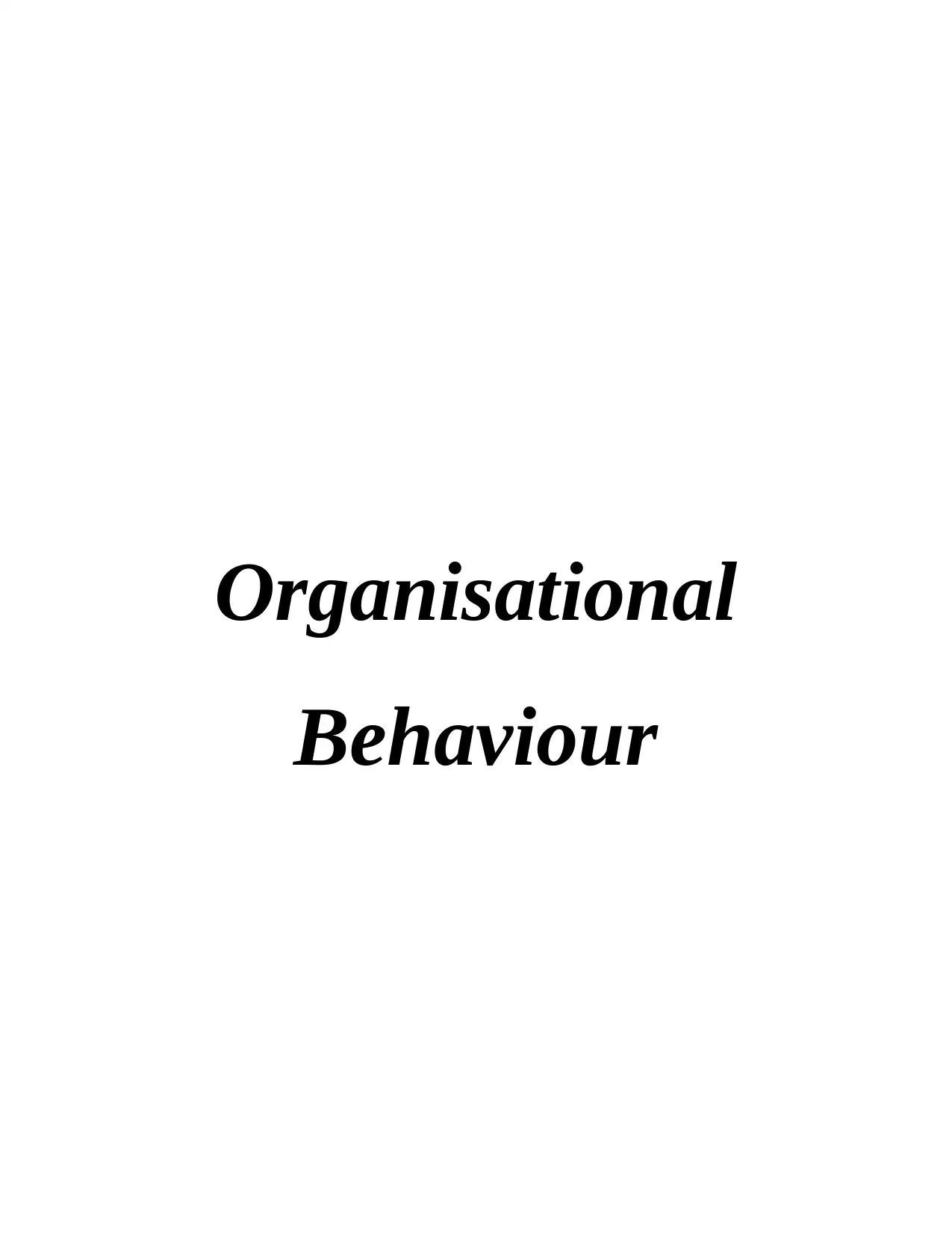
Organisational
Behaviour
Behaviour
Paraphrase This Document
Need a fresh take? Get an instant paraphrase of this document with our AI Paraphraser
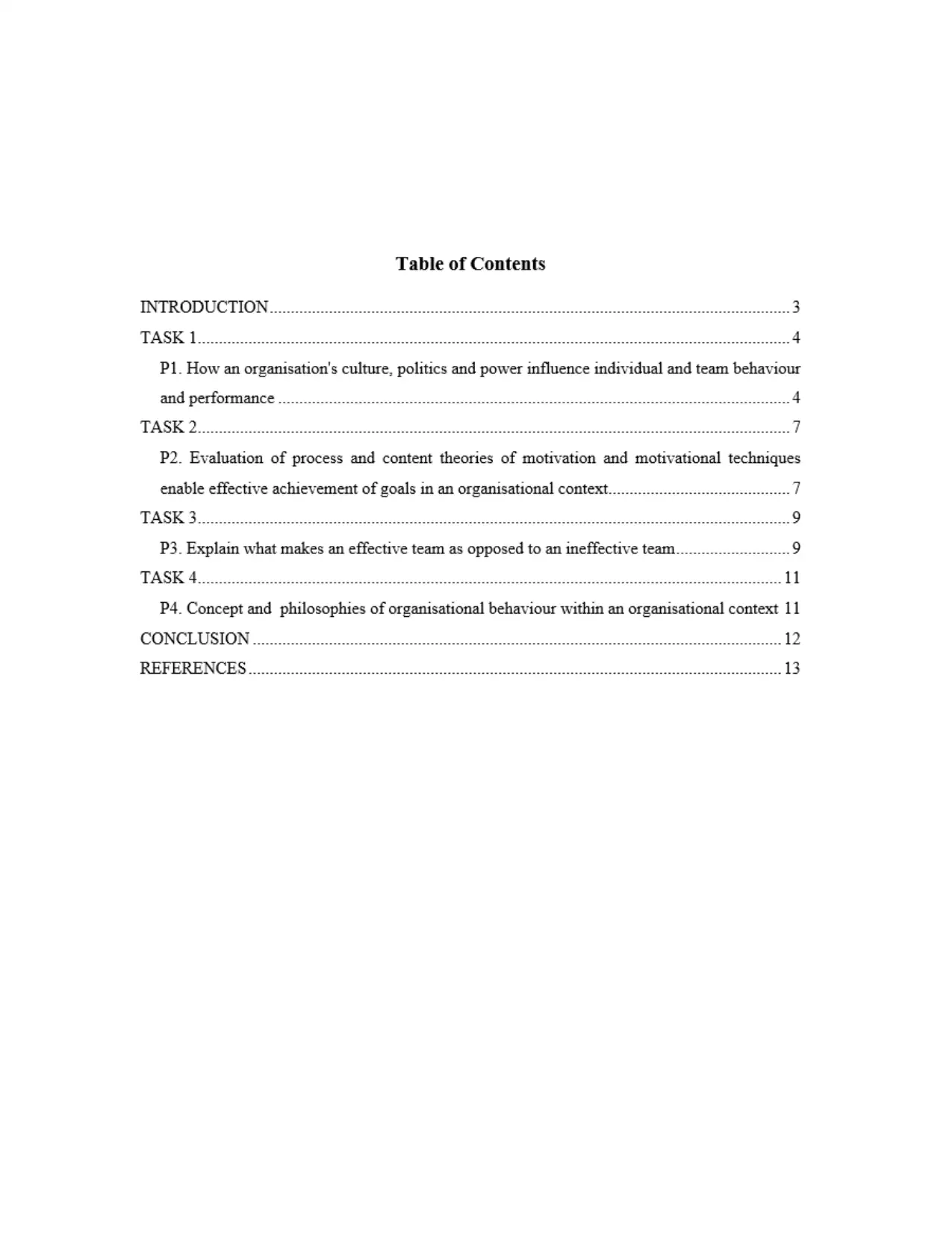
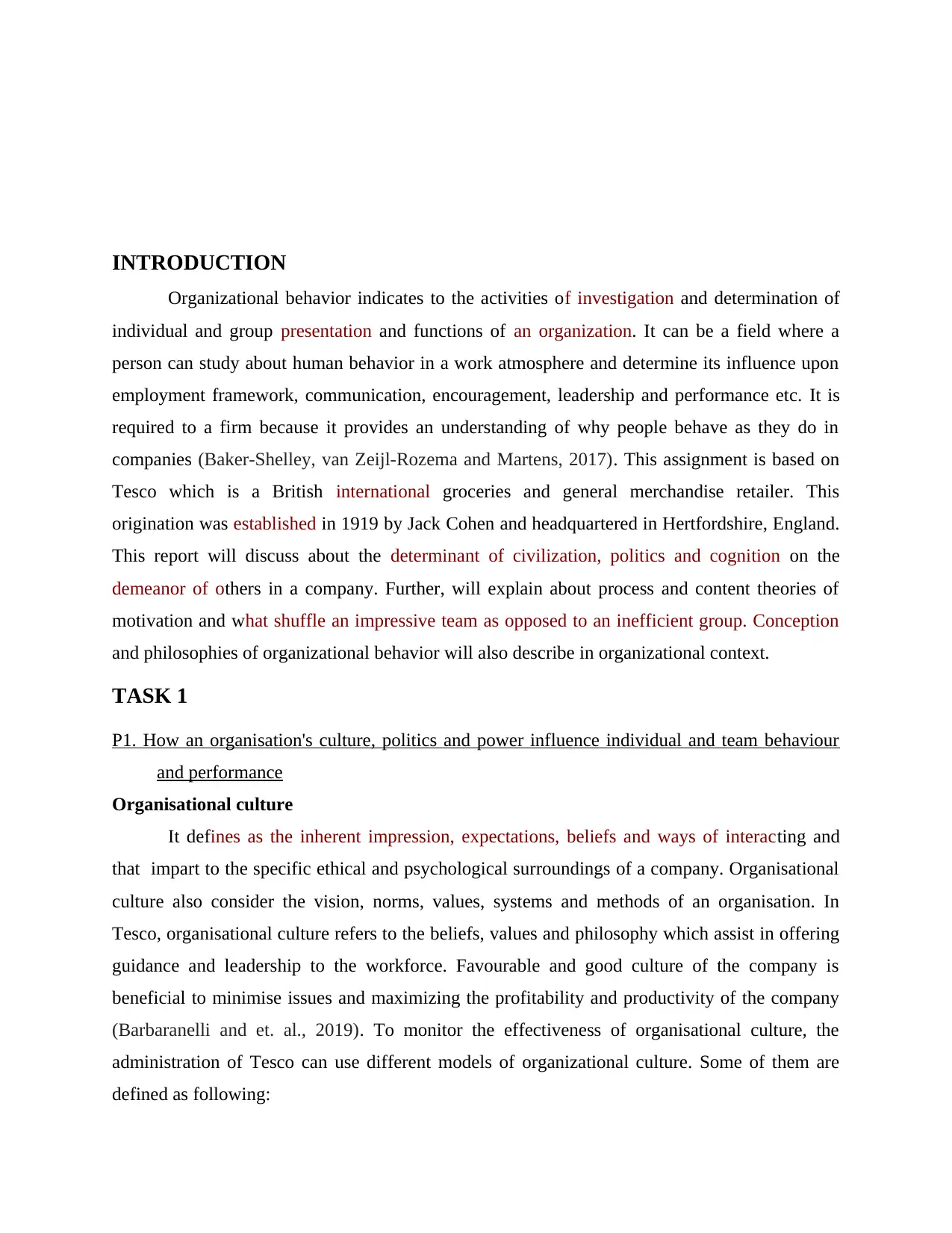
INTRODUCTION
Organizational behavior indicates to the activities of investigation and determination of
individual and group presentation and functions of an organization. It can be a field where a
person can study about human behavior in a work atmosphere and determine its influence upon
employment framework, communication, encouragement, leadership and performance etc. It is
required to a firm because it provides an understanding of why people behave as they do in
companies (Baker-Shelley, van Zeijl-Rozema and Martens, 2017). This assignment is based on
Tesco which is a British international groceries and general merchandise retailer. This
origination was established in 1919 by Jack Cohen and headquartered in Hertfordshire, England.
This report will discuss about the determinant of civilization, politics and cognition on the
demeanor of others in a company. Further, will explain about process and content theories of
motivation and what shuffle an impressive team as opposed to an inefficient group. Conception
and philosophies of organizational behavior will also describe in organizational context.
TASK 1
P1. How an organisation's culture, politics and power influence individual and team behaviour
and performance
Organisational culture
It defines as the inherent impression, expectations, beliefs and ways of interacting and
that impart to the specific ethical and psychological surroundings of a company. Organisational
culture also consider the vision, norms, values, systems and methods of an organisation. In
Tesco, organisational culture refers to the beliefs, values and philosophy which assist in offering
guidance and leadership to the workforce. Favourable and good culture of the company is
beneficial to minimise issues and maximizing the profitability and productivity of the company
(Barbaranelli and et. al., 2019). To monitor the effectiveness of organisational culture, the
administration of Tesco can use different models of organizational culture. Some of them are
defined as following:
Organizational behavior indicates to the activities of investigation and determination of
individual and group presentation and functions of an organization. It can be a field where a
person can study about human behavior in a work atmosphere and determine its influence upon
employment framework, communication, encouragement, leadership and performance etc. It is
required to a firm because it provides an understanding of why people behave as they do in
companies (Baker-Shelley, van Zeijl-Rozema and Martens, 2017). This assignment is based on
Tesco which is a British international groceries and general merchandise retailer. This
origination was established in 1919 by Jack Cohen and headquartered in Hertfordshire, England.
This report will discuss about the determinant of civilization, politics and cognition on the
demeanor of others in a company. Further, will explain about process and content theories of
motivation and what shuffle an impressive team as opposed to an inefficient group. Conception
and philosophies of organizational behavior will also describe in organizational context.
TASK 1
P1. How an organisation's culture, politics and power influence individual and team behaviour
and performance
Organisational culture
It defines as the inherent impression, expectations, beliefs and ways of interacting and
that impart to the specific ethical and psychological surroundings of a company. Organisational
culture also consider the vision, norms, values, systems and methods of an organisation. In
Tesco, organisational culture refers to the beliefs, values and philosophy which assist in offering
guidance and leadership to the workforce. Favourable and good culture of the company is
beneficial to minimise issues and maximizing the profitability and productivity of the company
(Barbaranelli and et. al., 2019). To monitor the effectiveness of organisational culture, the
administration of Tesco can use different models of organizational culture. Some of them are
defined as following:
⊘ This is a preview!⊘
Do you want full access?
Subscribe today to unlock all pages.

Trusted by 1+ million students worldwide
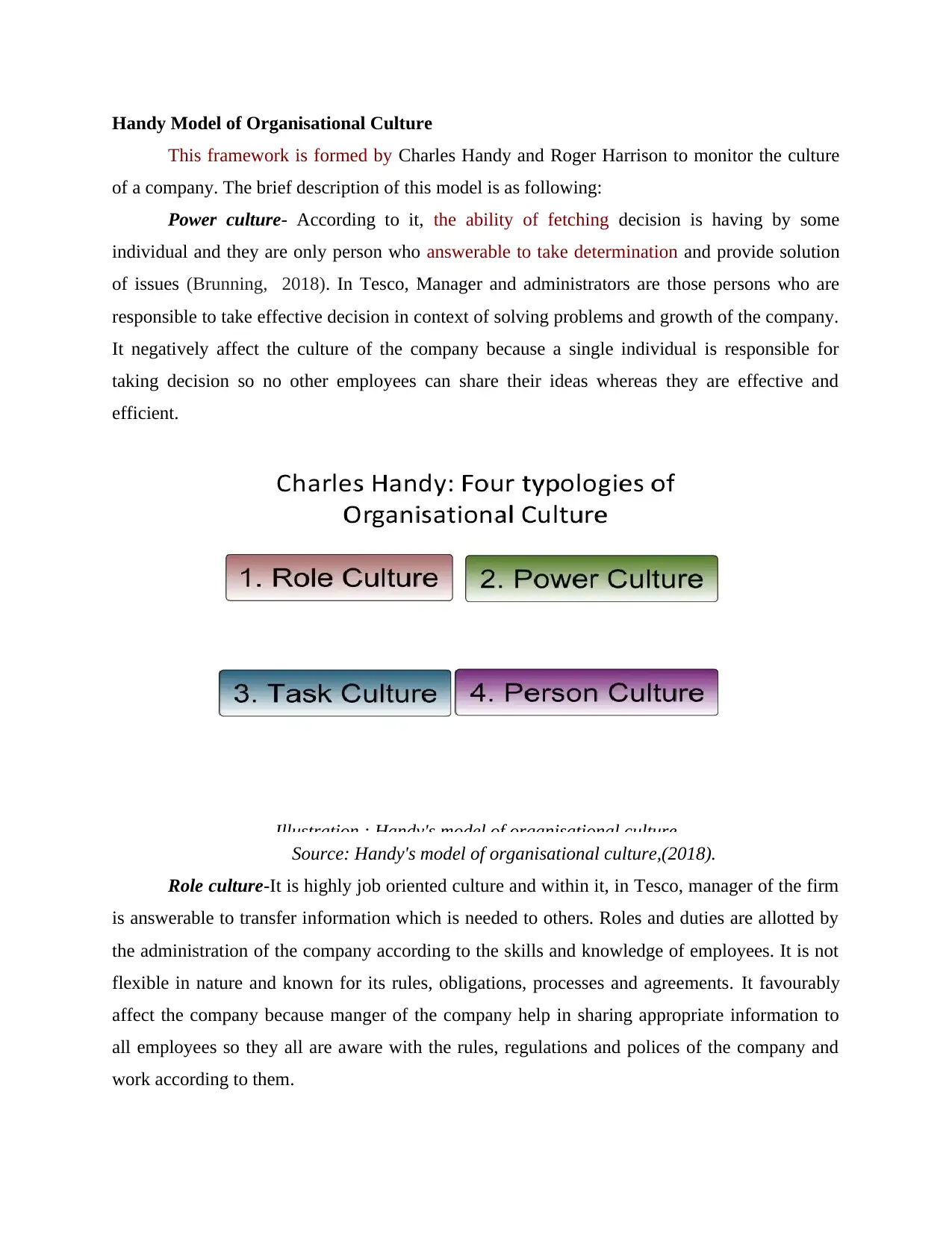
Handy Model of Organisational Culture
This framework is formed by Charles Handy and Roger Harrison to monitor the culture
of a company. The brief description of this model is as following:
Power culture- According to it, the ability of fetching decision is having by some
individual and they are only person who answerable to take determination and provide solution
of issues (Brunning, 2018). In Tesco, Manager and administrators are those persons who are
responsible to take effective decision in context of solving problems and growth of the company.
It negatively affect the culture of the company because a single individual is responsible for
taking decision so no other employees can share their ideas whereas they are effective and
efficient.
Source: Handy's model of organisational culture,(2018).
Role culture-It is highly job oriented culture and within it, in Tesco, manager of the firm
is answerable to transfer information which is needed to others. Roles and duties are allotted by
the administration of the company according to the skills and knowledge of employees. It is not
flexible in nature and known for its rules, obligations, processes and agreements. It favourably
affect the company because manger of the company help in sharing appropriate information to
all employees so they all are aware with the rules, regulations and polices of the company and
work according to them.
Illustration : Handy's model of organisational culture
This framework is formed by Charles Handy and Roger Harrison to monitor the culture
of a company. The brief description of this model is as following:
Power culture- According to it, the ability of fetching decision is having by some
individual and they are only person who answerable to take determination and provide solution
of issues (Brunning, 2018). In Tesco, Manager and administrators are those persons who are
responsible to take effective decision in context of solving problems and growth of the company.
It negatively affect the culture of the company because a single individual is responsible for
taking decision so no other employees can share their ideas whereas they are effective and
efficient.
Source: Handy's model of organisational culture,(2018).
Role culture-It is highly job oriented culture and within it, in Tesco, manager of the firm
is answerable to transfer information which is needed to others. Roles and duties are allotted by
the administration of the company according to the skills and knowledge of employees. It is not
flexible in nature and known for its rules, obligations, processes and agreements. It favourably
affect the company because manger of the company help in sharing appropriate information to
all employees so they all are aware with the rules, regulations and polices of the company and
work according to them.
Illustration : Handy's model of organisational culture
Paraphrase This Document
Need a fresh take? Get an instant paraphrase of this document with our AI Paraphraser
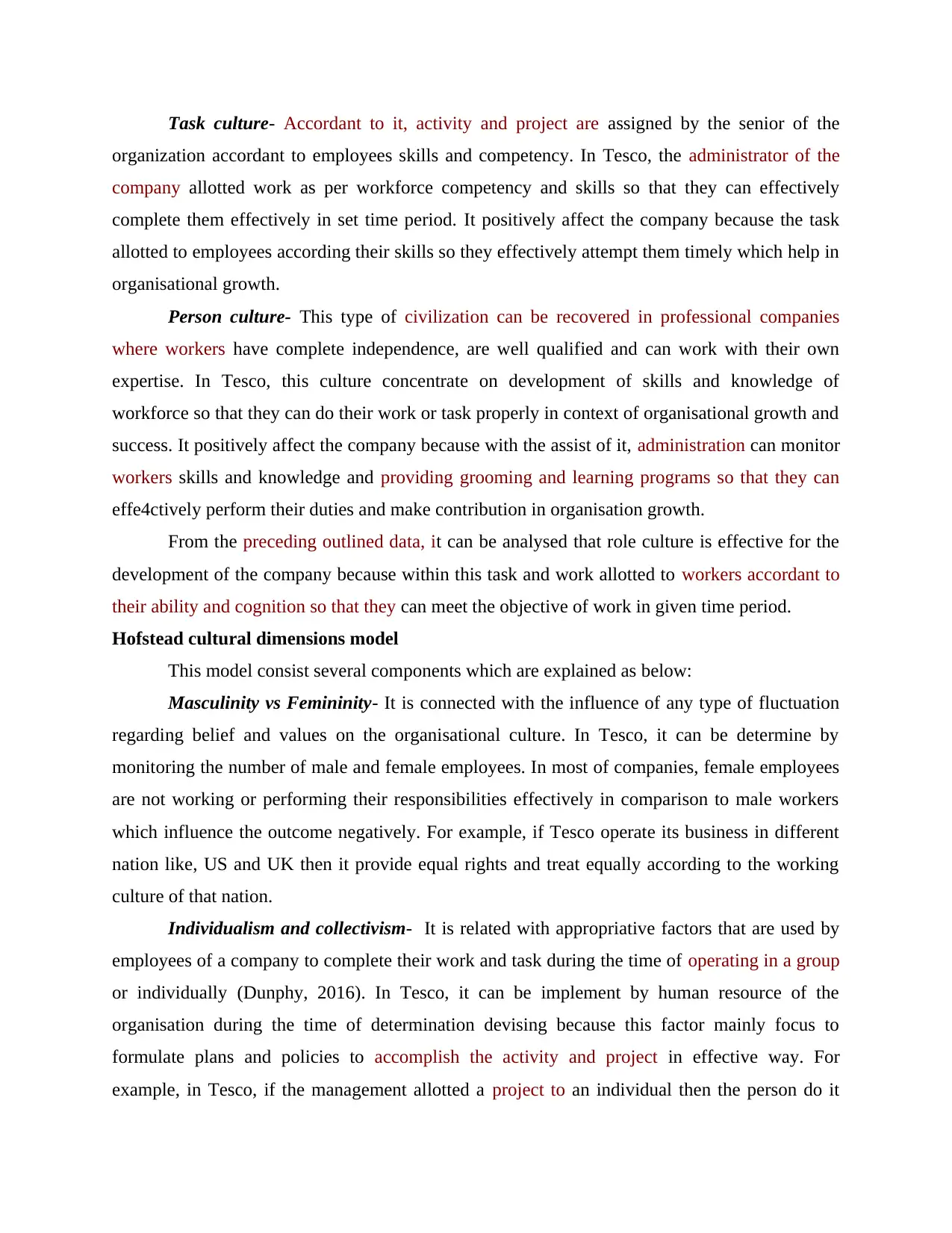
Task culture- Accordant to it, activity and project are assigned by the senior of the
organization accordant to employees skills and competency. In Tesco, the administrator of the
company allotted work as per workforce competency and skills so that they can effectively
complete them effectively in set time period. It positively affect the company because the task
allotted to employees according their skills so they effectively attempt them timely which help in
organisational growth.
Person culture- This type of civilization can be recovered in professional companies
where workers have complete independence, are well qualified and can work with their own
expertise. In Tesco, this culture concentrate on development of skills and knowledge of
workforce so that they can do their work or task properly in context of organisational growth and
success. It positively affect the company because with the assist of it, administration can monitor
workers skills and knowledge and providing grooming and learning programs so that they can
effe4ctively perform their duties and make contribution in organisation growth.
From the preceding outlined data, it can be analysed that role culture is effective for the
development of the company because within this task and work allotted to workers accordant to
their ability and cognition so that they can meet the objective of work in given time period.
Hofstead cultural dimensions model
This model consist several components which are explained as below:
Masculinity vs Femininity- It is connected with the influence of any type of fluctuation
regarding belief and values on the organisational culture. In Tesco, it can be determine by
monitoring the number of male and female employees. In most of companies, female employees
are not working or performing their responsibilities effectively in comparison to male workers
which influence the outcome negatively. For example, if Tesco operate its business in different
nation like, US and UK then it provide equal rights and treat equally according to the working
culture of that nation.
Individualism and collectivism- It is related with appropriative factors that are used by
employees of a company to complete their work and task during the time of operating in a group
or individually (Dunphy, 2016). In Tesco, it can be implement by human resource of the
organisation during the time of determination devising because this factor mainly focus to
formulate plans and policies to accomplish the activity and project in effective way. For
example, in Tesco, if the management allotted a project to an individual then the person do it
organization accordant to employees skills and competency. In Tesco, the administrator of the
company allotted work as per workforce competency and skills so that they can effectively
complete them effectively in set time period. It positively affect the company because the task
allotted to employees according their skills so they effectively attempt them timely which help in
organisational growth.
Person culture- This type of civilization can be recovered in professional companies
where workers have complete independence, are well qualified and can work with their own
expertise. In Tesco, this culture concentrate on development of skills and knowledge of
workforce so that they can do their work or task properly in context of organisational growth and
success. It positively affect the company because with the assist of it, administration can monitor
workers skills and knowledge and providing grooming and learning programs so that they can
effe4ctively perform their duties and make contribution in organisation growth.
From the preceding outlined data, it can be analysed that role culture is effective for the
development of the company because within this task and work allotted to workers accordant to
their ability and cognition so that they can meet the objective of work in given time period.
Hofstead cultural dimensions model
This model consist several components which are explained as below:
Masculinity vs Femininity- It is connected with the influence of any type of fluctuation
regarding belief and values on the organisational culture. In Tesco, it can be determine by
monitoring the number of male and female employees. In most of companies, female employees
are not working or performing their responsibilities effectively in comparison to male workers
which influence the outcome negatively. For example, if Tesco operate its business in different
nation like, US and UK then it provide equal rights and treat equally according to the working
culture of that nation.
Individualism and collectivism- It is related with appropriative factors that are used by
employees of a company to complete their work and task during the time of operating in a group
or individually (Dunphy, 2016). In Tesco, it can be implement by human resource of the
organisation during the time of determination devising because this factor mainly focus to
formulate plans and policies to accomplish the activity and project in effective way. For
example, in Tesco, if the management allotted a project to an individual then the person do it
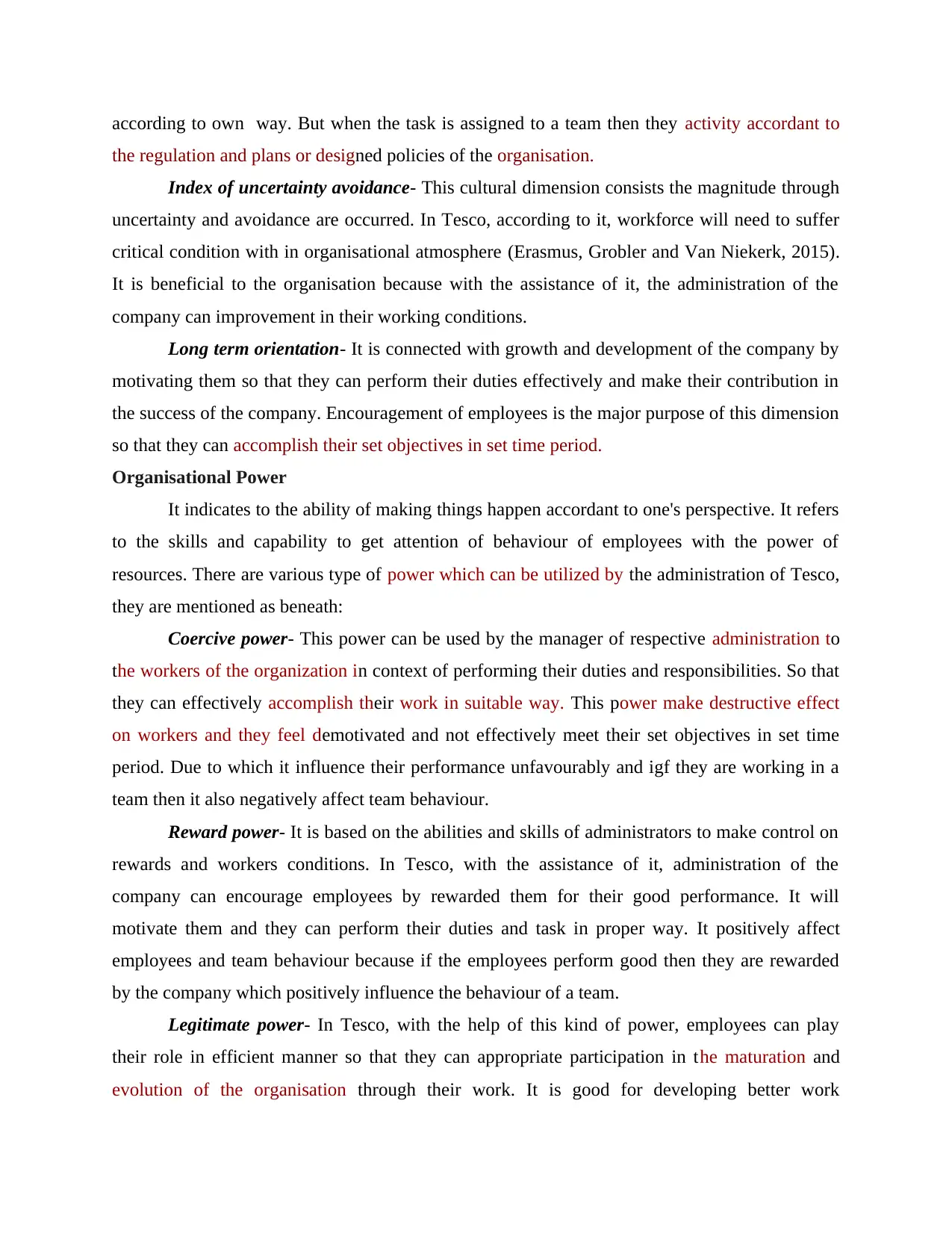
according to own way. But when the task is assigned to a team then they activity accordant to
the regulation and plans or designed policies of the organisation.
Index of uncertainty avoidance- This cultural dimension consists the magnitude through
uncertainty and avoidance are occurred. In Tesco, according to it, workforce will need to suffer
critical condition with in organisational atmosphere (Erasmus, Grobler and Van Niekerk, 2015).
It is beneficial to the organisation because with the assistance of it, the administration of the
company can improvement in their working conditions.
Long term orientation- It is connected with growth and development of the company by
motivating them so that they can perform their duties effectively and make their contribution in
the success of the company. Encouragement of employees is the major purpose of this dimension
so that they can accomplish their set objectives in set time period.
Organisational Power
It indicates to the ability of making things happen accordant to one's perspective. It refers
to the skills and capability to get attention of behaviour of employees with the power of
resources. There are various type of power which can be utilized by the administration of Tesco,
they are mentioned as beneath:
Coercive power- This power can be used by the manager of respective administration to
the workers of the organization in context of performing their duties and responsibilities. So that
they can effectively accomplish their work in suitable way. This power make destructive effect
on workers and they feel demotivated and not effectively meet their set objectives in set time
period. Due to which it influence their performance unfavourably and igf they are working in a
team then it also negatively affect team behaviour.
Reward power- It is based on the abilities and skills of administrators to make control on
rewards and workers conditions. In Tesco, with the assistance of it, administration of the
company can encourage employees by rewarded them for their good performance. It will
motivate them and they can perform their duties and task in proper way. It positively affect
employees and team behaviour because if the employees perform good then they are rewarded
by the company which positively influence the behaviour of a team.
Legitimate power- In Tesco, with the help of this kind of power, employees can play
their role in efficient manner so that they can appropriate participation in the maturation and
evolution of the organisation through their work. It is good for developing better work
the regulation and plans or designed policies of the organisation.
Index of uncertainty avoidance- This cultural dimension consists the magnitude through
uncertainty and avoidance are occurred. In Tesco, according to it, workforce will need to suffer
critical condition with in organisational atmosphere (Erasmus, Grobler and Van Niekerk, 2015).
It is beneficial to the organisation because with the assistance of it, the administration of the
company can improvement in their working conditions.
Long term orientation- It is connected with growth and development of the company by
motivating them so that they can perform their duties effectively and make their contribution in
the success of the company. Encouragement of employees is the major purpose of this dimension
so that they can accomplish their set objectives in set time period.
Organisational Power
It indicates to the ability of making things happen accordant to one's perspective. It refers
to the skills and capability to get attention of behaviour of employees with the power of
resources. There are various type of power which can be utilized by the administration of Tesco,
they are mentioned as beneath:
Coercive power- This power can be used by the manager of respective administration to
the workers of the organization in context of performing their duties and responsibilities. So that
they can effectively accomplish their work in suitable way. This power make destructive effect
on workers and they feel demotivated and not effectively meet their set objectives in set time
period. Due to which it influence their performance unfavourably and igf they are working in a
team then it also negatively affect team behaviour.
Reward power- It is based on the abilities and skills of administrators to make control on
rewards and workers conditions. In Tesco, with the assistance of it, administration of the
company can encourage employees by rewarded them for their good performance. It will
motivate them and they can perform their duties and task in proper way. It positively affect
employees and team behaviour because if the employees perform good then they are rewarded
by the company which positively influence the behaviour of a team.
Legitimate power- In Tesco, with the help of this kind of power, employees can play
their role in efficient manner so that they can appropriate participation in the maturation and
evolution of the organisation through their work. It is good for developing better work
⊘ This is a preview!⊘
Do you want full access?
Subscribe today to unlock all pages.

Trusted by 1+ million students worldwide
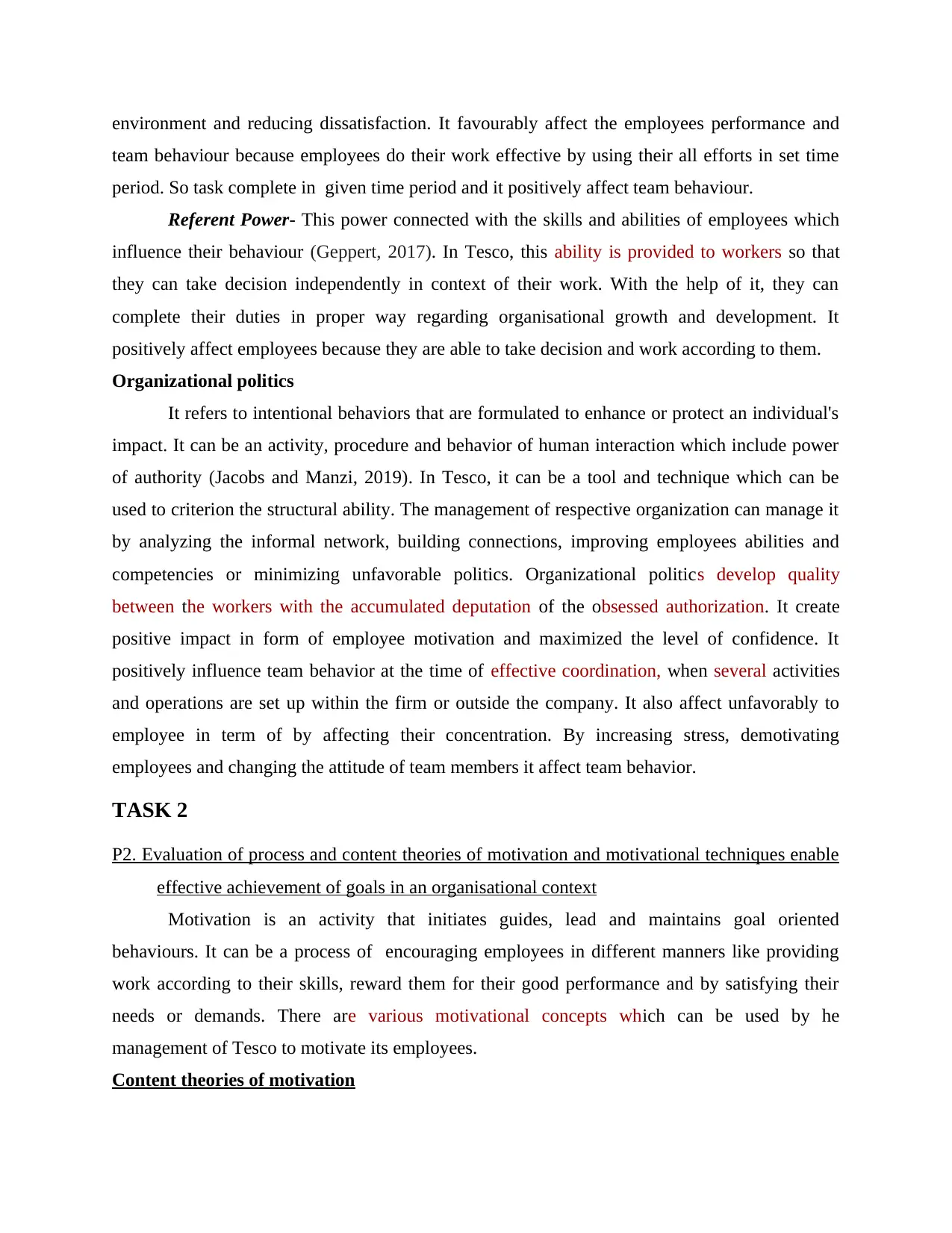
environment and reducing dissatisfaction. It favourably affect the employees performance and
team behaviour because employees do their work effective by using their all efforts in set time
period. So task complete in given time period and it positively affect team behaviour.
Referent Power- This power connected with the skills and abilities of employees which
influence their behaviour (Geppert, 2017). In Tesco, this ability is provided to workers so that
they can take decision independently in context of their work. With the help of it, they can
complete their duties in proper way regarding organisational growth and development. It
positively affect employees because they are able to take decision and work according to them.
Organizational politics
It refers to intentional behaviors that are formulated to enhance or protect an individual's
impact. It can be an activity, procedure and behavior of human interaction which include power
of authority (Jacobs and Manzi, 2019). In Tesco, it can be a tool and technique which can be
used to criterion the structural ability. The management of respective organization can manage it
by analyzing the informal network, building connections, improving employees abilities and
competencies or minimizing unfavorable politics. Organizational politics develop quality
between the workers with the accumulated deputation of the obsessed authorization. It create
positive impact in form of employee motivation and maximized the level of confidence. It
positively influence team behavior at the time of effective coordination, when several activities
and operations are set up within the firm or outside the company. It also affect unfavorably to
employee in term of by affecting their concentration. By increasing stress, demotivating
employees and changing the attitude of team members it affect team behavior.
TASK 2
P2. Evaluation of process and content theories of motivation and motivational techniques enable
effective achievement of goals in an organisational context
Motivation is an activity that initiates guides, lead and maintains goal oriented
behaviours. It can be a process of encouraging employees in different manners like providing
work according to their skills, reward them for their good performance and by satisfying their
needs or demands. There are various motivational concepts which can be used by he
management of Tesco to motivate its employees.
Content theories of motivation
team behaviour because employees do their work effective by using their all efforts in set time
period. So task complete in given time period and it positively affect team behaviour.
Referent Power- This power connected with the skills and abilities of employees which
influence their behaviour (Geppert, 2017). In Tesco, this ability is provided to workers so that
they can take decision independently in context of their work. With the help of it, they can
complete their duties in proper way regarding organisational growth and development. It
positively affect employees because they are able to take decision and work according to them.
Organizational politics
It refers to intentional behaviors that are formulated to enhance or protect an individual's
impact. It can be an activity, procedure and behavior of human interaction which include power
of authority (Jacobs and Manzi, 2019). In Tesco, it can be a tool and technique which can be
used to criterion the structural ability. The management of respective organization can manage it
by analyzing the informal network, building connections, improving employees abilities and
competencies or minimizing unfavorable politics. Organizational politics develop quality
between the workers with the accumulated deputation of the obsessed authorization. It create
positive impact in form of employee motivation and maximized the level of confidence. It
positively influence team behavior at the time of effective coordination, when several activities
and operations are set up within the firm or outside the company. It also affect unfavorably to
employee in term of by affecting their concentration. By increasing stress, demotivating
employees and changing the attitude of team members it affect team behavior.
TASK 2
P2. Evaluation of process and content theories of motivation and motivational techniques enable
effective achievement of goals in an organisational context
Motivation is an activity that initiates guides, lead and maintains goal oriented
behaviours. It can be a process of encouraging employees in different manners like providing
work according to their skills, reward them for their good performance and by satisfying their
needs or demands. There are various motivational concepts which can be used by he
management of Tesco to motivate its employees.
Content theories of motivation
Paraphrase This Document
Need a fresh take? Get an instant paraphrase of this document with our AI Paraphraser
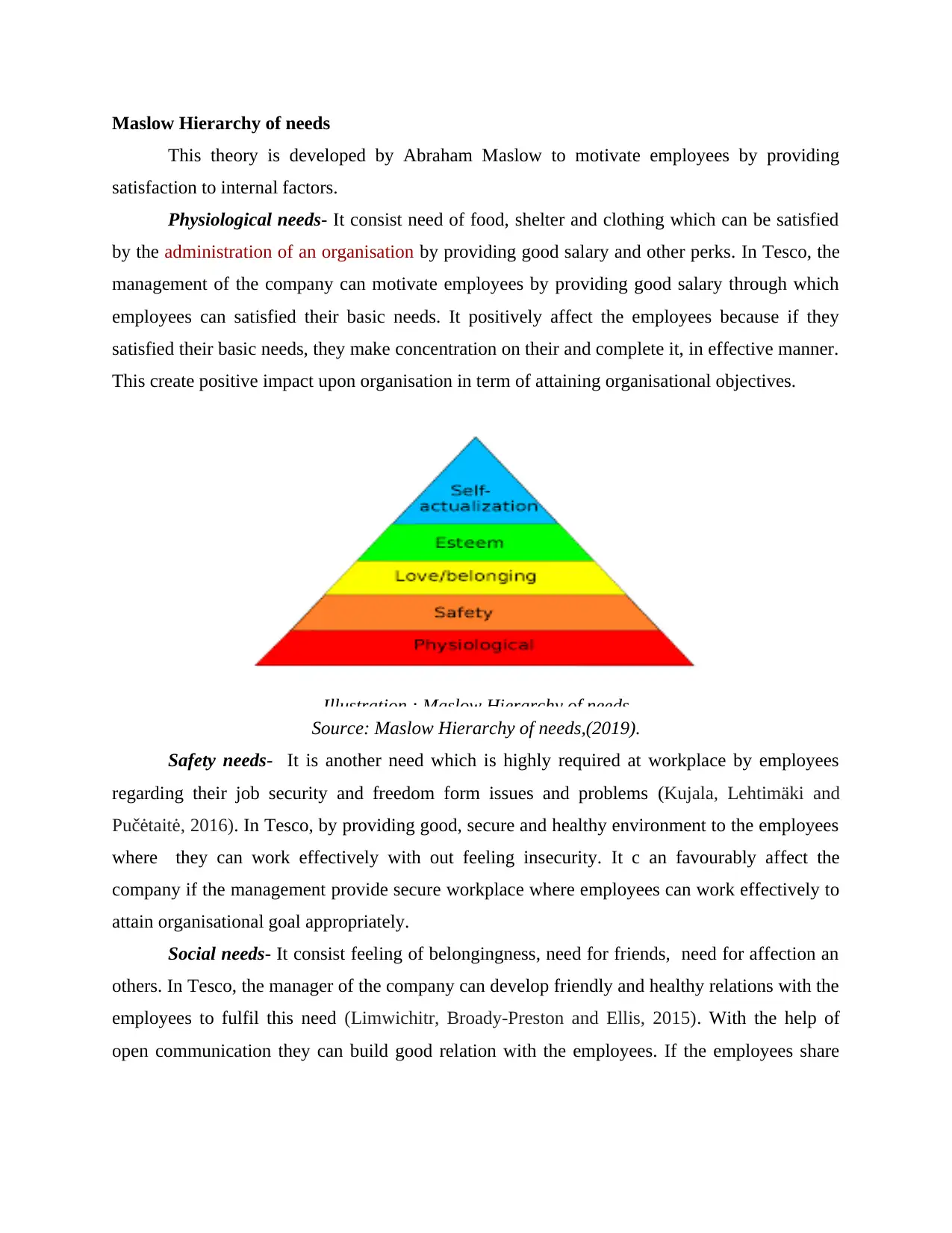
Maslow Hierarchy of needs
This theory is developed by Abraham Maslow to motivate employees by providing
satisfaction to internal factors.
Physiological needs- It consist need of food, shelter and clothing which can be satisfied
by the administration of an organisation by providing good salary and other perks. In Tesco, the
management of the company can motivate employees by providing good salary through which
employees can satisfied their basic needs. It positively affect the employees because if they
satisfied their basic needs, they make concentration on their and complete it, in effective manner.
This create positive impact upon organisation in term of attaining organisational objectives.
Source: Maslow Hierarchy of needs,(2019).
Safety needs- It is another need which is highly required at workplace by employees
regarding their job security and freedom form issues and problems (Kujala, Lehtimäki and
Pučėtaitė, 2016). In Tesco, by providing good, secure and healthy environment to the employees
where they can work effectively with out feeling insecurity. It c an favourably affect the
company if the management provide secure workplace where employees can work effectively to
attain organisational goal appropriately.
Social needs- It consist feeling of belongingness, need for friends, need for affection an
others. In Tesco, the manager of the company can develop friendly and healthy relations with the
employees to fulfil this need (Limwichitr, Broady-Preston and Ellis, 2015). With the help of
open communication they can build good relation with the employees. If the employees share
Illustration : Maslow Hierarchy of needs
This theory is developed by Abraham Maslow to motivate employees by providing
satisfaction to internal factors.
Physiological needs- It consist need of food, shelter and clothing which can be satisfied
by the administration of an organisation by providing good salary and other perks. In Tesco, the
management of the company can motivate employees by providing good salary through which
employees can satisfied their basic needs. It positively affect the employees because if they
satisfied their basic needs, they make concentration on their and complete it, in effective manner.
This create positive impact upon organisation in term of attaining organisational objectives.
Source: Maslow Hierarchy of needs,(2019).
Safety needs- It is another need which is highly required at workplace by employees
regarding their job security and freedom form issues and problems (Kujala, Lehtimäki and
Pučėtaitė, 2016). In Tesco, by providing good, secure and healthy environment to the employees
where they can work effectively with out feeling insecurity. It c an favourably affect the
company if the management provide secure workplace where employees can work effectively to
attain organisational goal appropriately.
Social needs- It consist feeling of belongingness, need for friends, need for affection an
others. In Tesco, the manager of the company can develop friendly and healthy relations with the
employees to fulfil this need (Limwichitr, Broady-Preston and Ellis, 2015). With the help of
open communication they can build good relation with the employees. If the employees share
Illustration : Maslow Hierarchy of needs
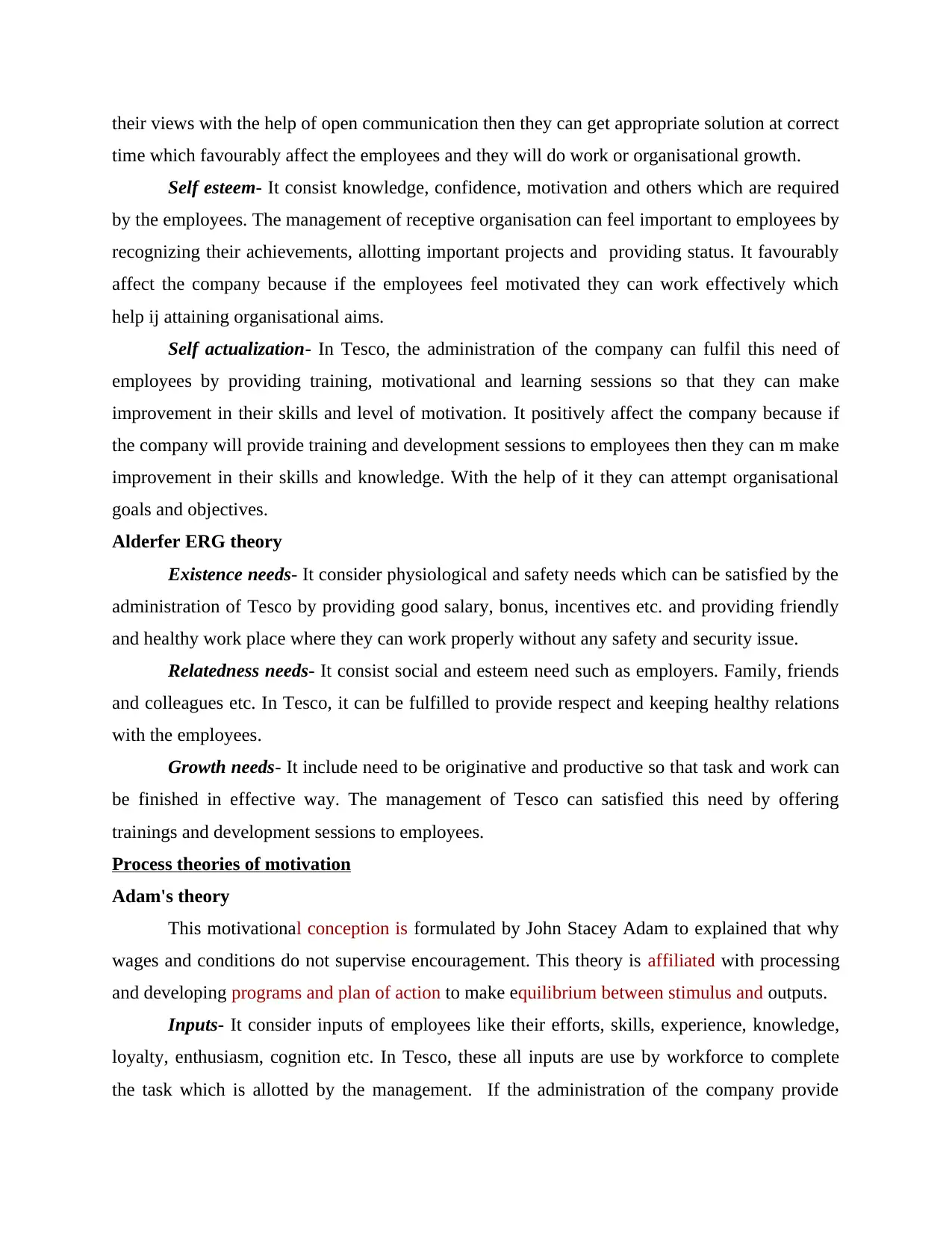
their views with the help of open communication then they can get appropriate solution at correct
time which favourably affect the employees and they will do work or organisational growth.
Self esteem- It consist knowledge, confidence, motivation and others which are required
by the employees. The management of receptive organisation can feel important to employees by
recognizing their achievements, allotting important projects and providing status. It favourably
affect the company because if the employees feel motivated they can work effectively which
help ij attaining organisational aims.
Self actualization- In Tesco, the administration of the company can fulfil this need of
employees by providing training, motivational and learning sessions so that they can make
improvement in their skills and level of motivation. It positively affect the company because if
the company will provide training and development sessions to employees then they can m make
improvement in their skills and knowledge. With the help of it they can attempt organisational
goals and objectives.
Alderfer ERG theory
Existence needs- It consider physiological and safety needs which can be satisfied by the
administration of Tesco by providing good salary, bonus, incentives etc. and providing friendly
and healthy work place where they can work properly without any safety and security issue.
Relatedness needs- It consist social and esteem need such as employers. Family, friends
and colleagues etc. In Tesco, it can be fulfilled to provide respect and keeping healthy relations
with the employees.
Growth needs- It include need to be originative and productive so that task and work can
be finished in effective way. The management of Tesco can satisfied this need by offering
trainings and development sessions to employees.
Process theories of motivation
Adam's theory
This motivational conception is formulated by John Stacey Adam to explained that why
wages and conditions do not supervise encouragement. This theory is affiliated with processing
and developing programs and plan of action to make equilibrium between stimulus and outputs.
Inputs- It consider inputs of employees like their efforts, skills, experience, knowledge,
loyalty, enthusiasm, cognition etc. In Tesco, these all inputs are use by workforce to complete
the task which is allotted by the management. If the administration of the company provide
time which favourably affect the employees and they will do work or organisational growth.
Self esteem- It consist knowledge, confidence, motivation and others which are required
by the employees. The management of receptive organisation can feel important to employees by
recognizing their achievements, allotting important projects and providing status. It favourably
affect the company because if the employees feel motivated they can work effectively which
help ij attaining organisational aims.
Self actualization- In Tesco, the administration of the company can fulfil this need of
employees by providing training, motivational and learning sessions so that they can make
improvement in their skills and level of motivation. It positively affect the company because if
the company will provide training and development sessions to employees then they can m make
improvement in their skills and knowledge. With the help of it they can attempt organisational
goals and objectives.
Alderfer ERG theory
Existence needs- It consider physiological and safety needs which can be satisfied by the
administration of Tesco by providing good salary, bonus, incentives etc. and providing friendly
and healthy work place where they can work properly without any safety and security issue.
Relatedness needs- It consist social and esteem need such as employers. Family, friends
and colleagues etc. In Tesco, it can be fulfilled to provide respect and keeping healthy relations
with the employees.
Growth needs- It include need to be originative and productive so that task and work can
be finished in effective way. The management of Tesco can satisfied this need by offering
trainings and development sessions to employees.
Process theories of motivation
Adam's theory
This motivational conception is formulated by John Stacey Adam to explained that why
wages and conditions do not supervise encouragement. This theory is affiliated with processing
and developing programs and plan of action to make equilibrium between stimulus and outputs.
Inputs- It consider inputs of employees like their efforts, skills, experience, knowledge,
loyalty, enthusiasm, cognition etc. In Tesco, these all inputs are use by workforce to complete
the task which is allotted by the management. If the administration of the company provide
⊘ This is a preview!⊘
Do you want full access?
Subscribe today to unlock all pages.

Trusted by 1+ million students worldwide
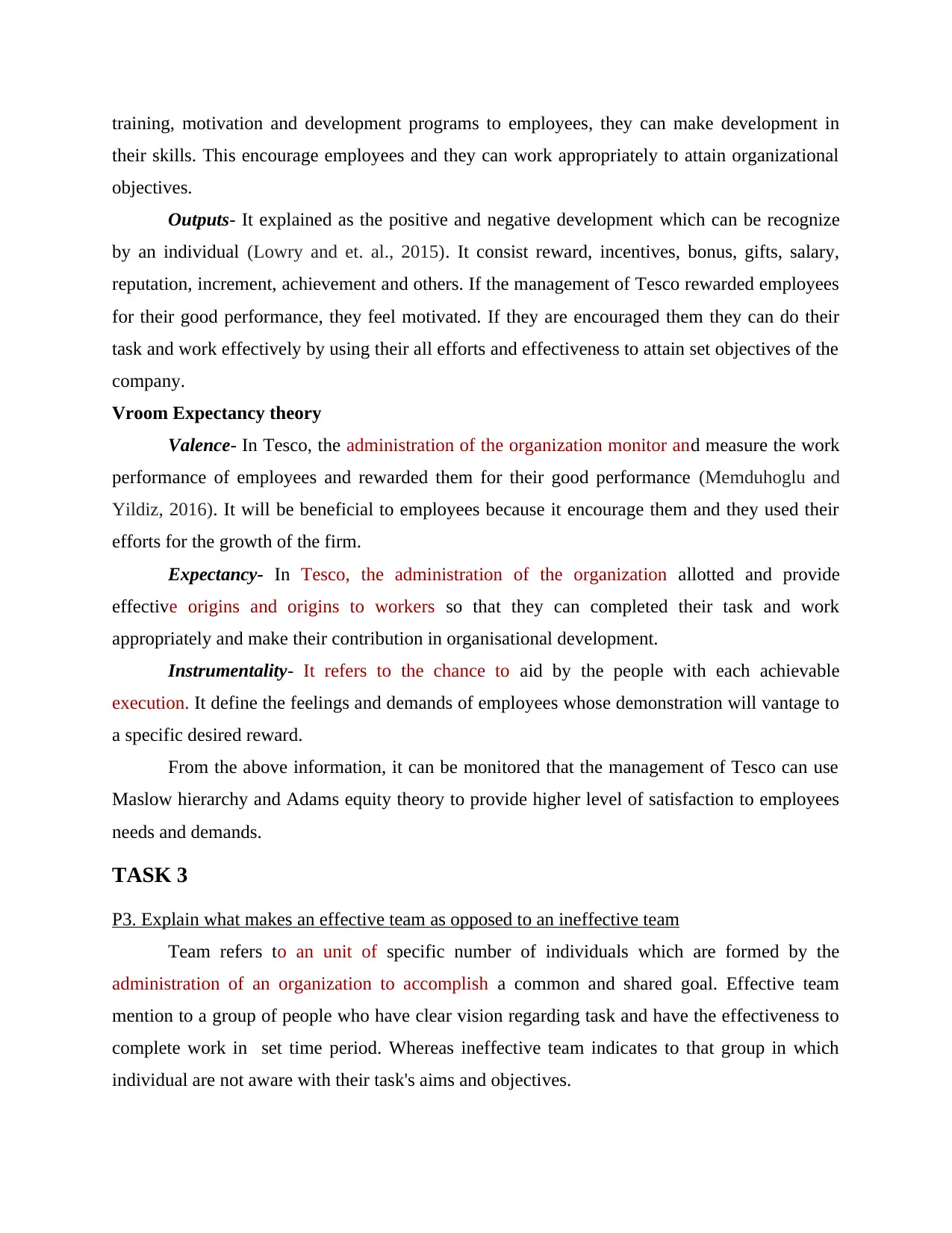
training, motivation and development programs to employees, they can make development in
their skills. This encourage employees and they can work appropriately to attain organizational
objectives.
Outputs- It explained as the positive and negative development which can be recognize
by an individual (Lowry and et. al., 2015). It consist reward, incentives, bonus, gifts, salary,
reputation, increment, achievement and others. If the management of Tesco rewarded employees
for their good performance, they feel motivated. If they are encouraged them they can do their
task and work effectively by using their all efforts and effectiveness to attain set objectives of the
company.
Vroom Expectancy theory
Valence- In Tesco, the administration of the organization monitor and measure the work
performance of employees and rewarded them for their good performance (Memduhoglu and
Yildiz, 2016). It will be beneficial to employees because it encourage them and they used their
efforts for the growth of the firm.
Expectancy- In Tesco, the administration of the organization allotted and provide
effective origins and origins to workers so that they can completed their task and work
appropriately and make their contribution in organisational development.
Instrumentality- It refers to the chance to aid by the people with each achievable
execution. It define the feelings and demands of employees whose demonstration will vantage to
a specific desired reward.
From the above information, it can be monitored that the management of Tesco can use
Maslow hierarchy and Adams equity theory to provide higher level of satisfaction to employees
needs and demands.
TASK 3
P3. Explain what makes an effective team as opposed to an ineffective team
Team refers to an unit of specific number of individuals which are formed by the
administration of an organization to accomplish a common and shared goal. Effective team
mention to a group of people who have clear vision regarding task and have the effectiveness to
complete work in set time period. Whereas ineffective team indicates to that group in which
individual are not aware with their task's aims and objectives.
their skills. This encourage employees and they can work appropriately to attain organizational
objectives.
Outputs- It explained as the positive and negative development which can be recognize
by an individual (Lowry and et. al., 2015). It consist reward, incentives, bonus, gifts, salary,
reputation, increment, achievement and others. If the management of Tesco rewarded employees
for their good performance, they feel motivated. If they are encouraged them they can do their
task and work effectively by using their all efforts and effectiveness to attain set objectives of the
company.
Vroom Expectancy theory
Valence- In Tesco, the administration of the organization monitor and measure the work
performance of employees and rewarded them for their good performance (Memduhoglu and
Yildiz, 2016). It will be beneficial to employees because it encourage them and they used their
efforts for the growth of the firm.
Expectancy- In Tesco, the administration of the organization allotted and provide
effective origins and origins to workers so that they can completed their task and work
appropriately and make their contribution in organisational development.
Instrumentality- It refers to the chance to aid by the people with each achievable
execution. It define the feelings and demands of employees whose demonstration will vantage to
a specific desired reward.
From the above information, it can be monitored that the management of Tesco can use
Maslow hierarchy and Adams equity theory to provide higher level of satisfaction to employees
needs and demands.
TASK 3
P3. Explain what makes an effective team as opposed to an ineffective team
Team refers to an unit of specific number of individuals which are formed by the
administration of an organization to accomplish a common and shared goal. Effective team
mention to a group of people who have clear vision regarding task and have the effectiveness to
complete work in set time period. Whereas ineffective team indicates to that group in which
individual are not aware with their task's aims and objectives.
Paraphrase This Document
Need a fresh take? Get an instant paraphrase of this document with our AI Paraphraser
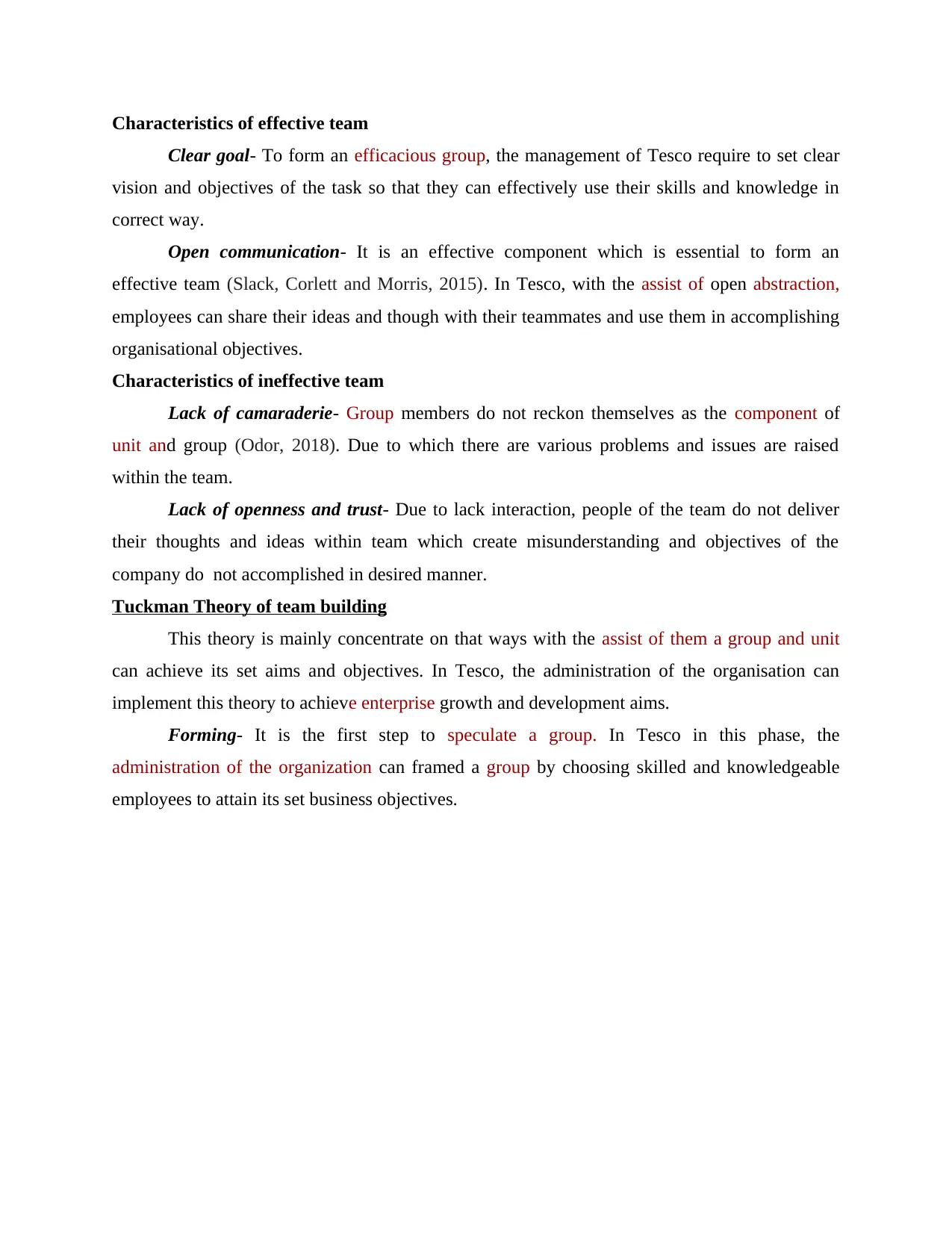
Characteristics of effective team
Clear goal- To form an efficacious group, the management of Tesco require to set clear
vision and objectives of the task so that they can effectively use their skills and knowledge in
correct way.
Open communication- It is an effective component which is essential to form an
effective team (Slack, Corlett and Morris, 2015). In Tesco, with the assist of open abstraction,
employees can share their ideas and though with their teammates and use them in accomplishing
organisational objectives.
Characteristics of ineffective team
Lack of camaraderie- Group members do not reckon themselves as the component of
unit and group (Odor, 2018). Due to which there are various problems and issues are raised
within the team.
Lack of openness and trust- Due to lack interaction, people of the team do not deliver
their thoughts and ideas within team which create misunderstanding and objectives of the
company do not accomplished in desired manner.
Tuckman Theory of team building
This theory is mainly concentrate on that ways with the assist of them a group and unit
can achieve its set aims and objectives. In Tesco, the administration of the organisation can
implement this theory to achieve enterprise growth and development aims.
Forming- It is the first step to speculate a group. In Tesco in this phase, the
administration of the organization can framed a group by choosing skilled and knowledgeable
employees to attain its set business objectives.
Clear goal- To form an efficacious group, the management of Tesco require to set clear
vision and objectives of the task so that they can effectively use their skills and knowledge in
correct way.
Open communication- It is an effective component which is essential to form an
effective team (Slack, Corlett and Morris, 2015). In Tesco, with the assist of open abstraction,
employees can share their ideas and though with their teammates and use them in accomplishing
organisational objectives.
Characteristics of ineffective team
Lack of camaraderie- Group members do not reckon themselves as the component of
unit and group (Odor, 2018). Due to which there are various problems and issues are raised
within the team.
Lack of openness and trust- Due to lack interaction, people of the team do not deliver
their thoughts and ideas within team which create misunderstanding and objectives of the
company do not accomplished in desired manner.
Tuckman Theory of team building
This theory is mainly concentrate on that ways with the assist of them a group and unit
can achieve its set aims and objectives. In Tesco, the administration of the organisation can
implement this theory to achieve enterprise growth and development aims.
Forming- It is the first step to speculate a group. In Tesco in this phase, the
administration of the organization can framed a group by choosing skilled and knowledgeable
employees to attain its set business objectives.
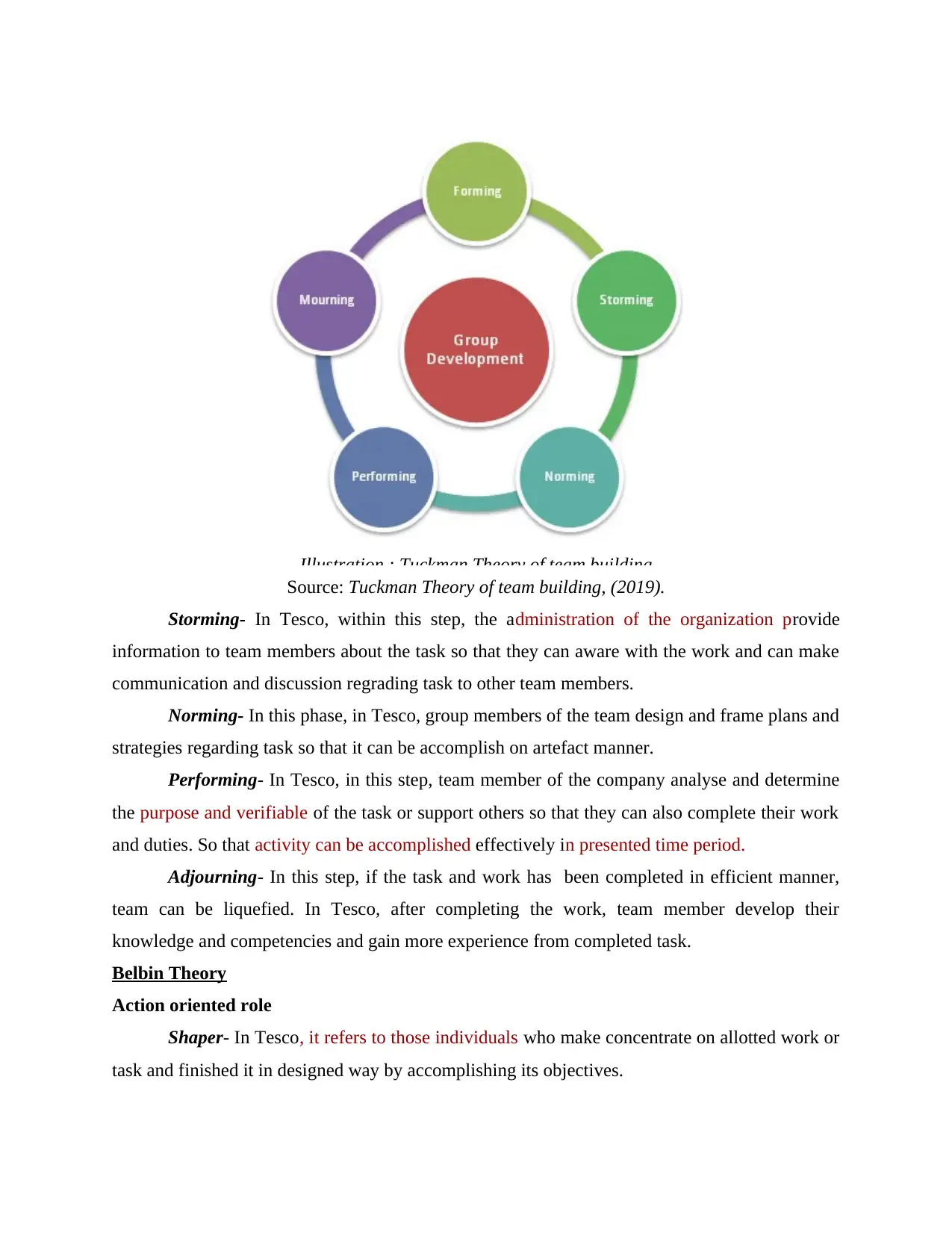
Source: Tuckman Theory of team building, (2019).
Storming- In Tesco, within this step, the administration of the organization provide
information to team members about the task so that they can aware with the work and can make
communication and discussion regrading task to other team members.
Norming- In this phase, in Tesco, group members of the team design and frame plans and
strategies regarding task so that it can be accomplish on artefact manner.
Performing- In Tesco, in this step, team member of the company analyse and determine
the purpose and verifiable of the task or support others so that they can also complete their work
and duties. So that activity can be accomplished effectively in presented time period.
Adjourning- In this step, if the task and work has been completed in efficient manner,
team can be liquefied. In Tesco, after completing the work, team member develop their
knowledge and competencies and gain more experience from completed task.
Belbin Theory
Action oriented role
Shaper- In Tesco, it refers to those individuals who make concentrate on allotted work or
task and finished it in designed way by accomplishing its objectives.
Illustration : Tuckman Theory of team building
Storming- In Tesco, within this step, the administration of the organization provide
information to team members about the task so that they can aware with the work and can make
communication and discussion regrading task to other team members.
Norming- In this phase, in Tesco, group members of the team design and frame plans and
strategies regarding task so that it can be accomplish on artefact manner.
Performing- In Tesco, in this step, team member of the company analyse and determine
the purpose and verifiable of the task or support others so that they can also complete their work
and duties. So that activity can be accomplished effectively in presented time period.
Adjourning- In this step, if the task and work has been completed in efficient manner,
team can be liquefied. In Tesco, after completing the work, team member develop their
knowledge and competencies and gain more experience from completed task.
Belbin Theory
Action oriented role
Shaper- In Tesco, it refers to those individuals who make concentrate on allotted work or
task and finished it in designed way by accomplishing its objectives.
Illustration : Tuckman Theory of team building
⊘ This is a preview!⊘
Do you want full access?
Subscribe today to unlock all pages.

Trusted by 1+ million students worldwide
1 out of 18
Related Documents
Your All-in-One AI-Powered Toolkit for Academic Success.
+13062052269
info@desklib.com
Available 24*7 on WhatsApp / Email
![[object Object]](/_next/static/media/star-bottom.7253800d.svg)
Unlock your academic potential
Copyright © 2020–2026 A2Z Services. All Rights Reserved. Developed and managed by ZUCOL.





